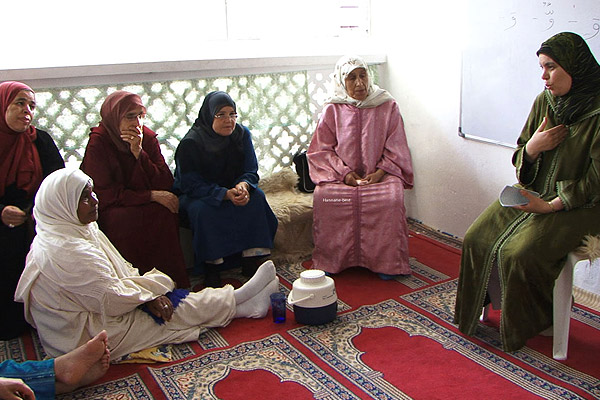
These Moroccan Muslim Women are Changing How Women are Treated
- By Alison Lesley --
- 01 Jun 2015 --

The film Casablanca Calling follows Moroccan Muslim women determined to challenge their country’s treatment of women.
When Americans picture Morocco, and other Islamic countries, they picture immense amounts of misogyny, and frequently attribute it to religious views. Since 2006, however, morchidat, a generation of female religious leaders in Morocco, have been working actively to change that perspective, as well as to improve the way women and girls are treated. These women have got noticed all around, and even have been invited to speak in other Muslim countries to share their stories. The morchidat is the prime focus of the film Casablanca Calling.
Merieme Addou, the associate producer behind Casablanca Calling, calls the Morchidat “a rare experiment in the Muslim world.” They are the first in a Muslim country to be given a religious role, particularly such a large one. The impact these women are making is huge, giving guidance to all women and girls from orphanages to schools to rural villages and beyond. They are leading a social revolution in Morocco that may expand outward to other Muslim countries. According to Hannane, one of the leading Morchidats, “Morocco and other Muslim countries have been living in a period of ignorance… Many people knowingly or unknowingly have blocked the most basic rights in Islam gives women.”
I really believe in what those women are doing in Morocco, they're just helping Muslim women gain the rights they're meant to have.
— leul (@lakimariam) May 28, 2015
Morocco doesn’t permit marriage below the age of 18, yet many young girls are forced to marry early. Humane has spoken to women who complain that their 14 year old daughter hasn’t found a husband, while the other girls struggle to keep attending school because their families “say now they’re getting married [they] shouldn’t leave the house.” With over 400 Morchidat in Morocco working toward improving women’s rights to schooling, choice in marriage and many other basic rights, women finally have someone to talk to about their moral, spiritual, social and personal problems.
Bouchra, a Morchidat that works towards women and girl’s educational rights, was told by a fieldworker that “women are doomed and then they die.” Women and girls are set to work in the fields, living in servitude and misogyny. Domestic abuse is common in those areas. Bouchra is a loved mentor in the rural boarding schools that are made for the poor, where she has been called on for help when students have committed suicide. One such instance was because the young girl’s father saw her hanging around a boy, and beat her in front of her friends, leading to her suicide.
Just because you study #Islam & wear hejab, #Arab-style neqab or chadari doesn't mean you can't be a "champion" of #women's rights
— Mrs.Libya (@serbialibya) May 25, 2015
With the goal of further reforms throughout Morocco, the Morchidat aims to give women more rights. Karima, one of the women invited abroad, encourages Moroccan youth to find pride in their Moroccan identity. Casablanca Calling will provide a deeper look into Moroccan culture, showing that though “many think Islam oppresses woman and restricts their freedoms… this is because of the traditions that have nothing to do with Islam.” Instead, it is the society who chooses to ignore their laws that are in place to protect against these very situations.




















